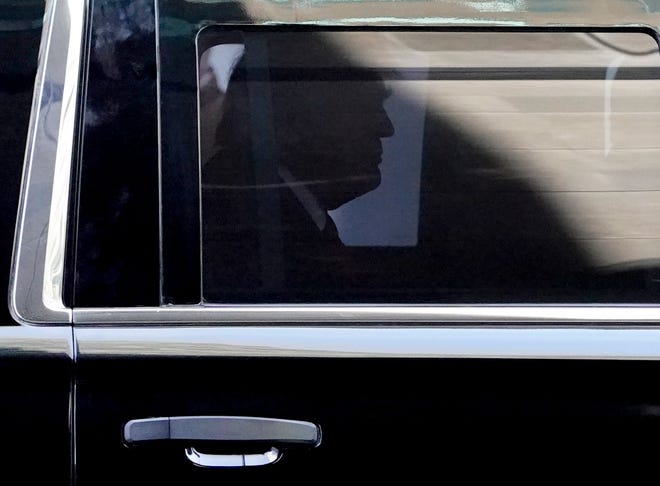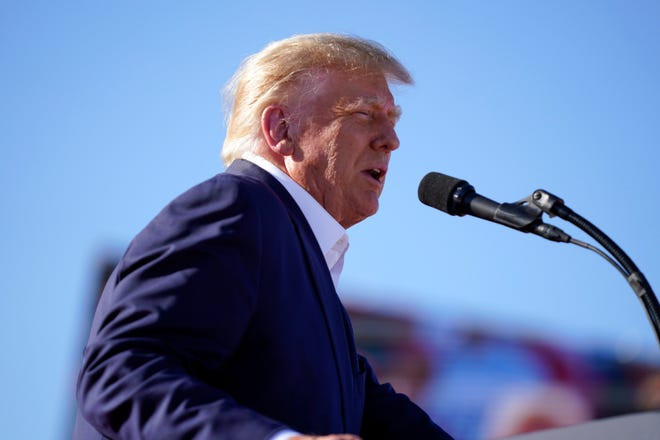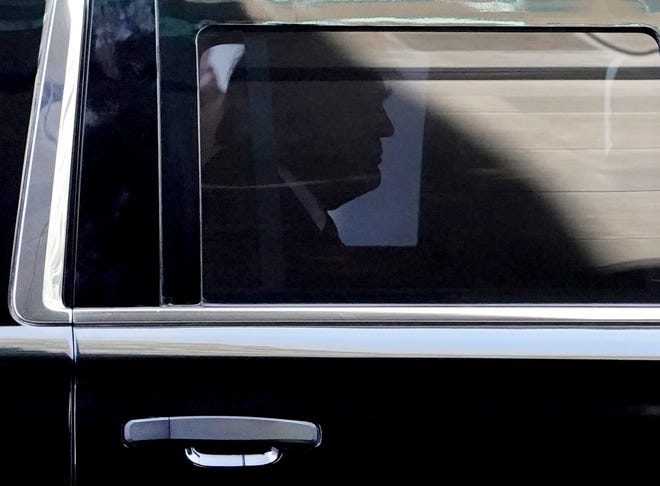[ad_1]
Donald Trump was arraigned in Manhattan Tuesday as the first former president to ever be criminally charged.
He was formally charged with 34 felony counts for falsifying business records in relation to a hush-money payment made to Stormy Daniels in the days before the 2016 election.
Trump pled not guilty to the charges and his arraignment sets in motion a long series of legal proceedings that could eventually result in a criminal trial.
Here’s what comes next for Trump, both legally and politically.

Trump’s mugshot? Fingerprinting?
Before his arraignment, Trump was processed, mostly, like every other defendant in the criminal justice system. The former president went through the standard proceedings behind closed doors, including:
- A Miranda warning: Trump was read the standard Miranda warning that is given to all criminal suspects. He was told he had the right to remain silent, the right to an attorney, and that anything he said could be used against him in a court of law.
- No mug shot, but fingerprinted: Trump was not subjected to be photographed, but was still fingerprinted and given a booking number.
Stay in the conversation on politics:Sign up for the OnPolitics newsletter
What happened at Trump’s arraignment?
Trump appeared before Judge Juan Merchan, who handled Trump’s arraignment in New York. The indictment was unsealed to the public and Merchan outlined the charges against him, which were 34 felony counts of falsifying business records.
Afterwards, Trump pleaded not guilty and was later released. Due to the nature of the charges, which are non-violent, and Trump being a first-time offender, the former president was not placed in jail.
Related:Donald Trump plans to turn his arraignment into a political spectacle. Here’s how.
What’s next for Trump in court?
Trump’s arraignment starts a legal process that could result in a trial, but Trump’s legal team is likely to file various pre-trial motions that includes dismissing the case outright or a change of venue.
Legal analysts and experts told USA TODAY that Trump has plenty of avenues to slow-walk the case, something he hasn’t shied away from in his other court battles.
More in-depth coverage:Donald Trump expected to unleash wave of legal challenges after Tuesday arraignment in New York
David Super, a law professor at Georgetown University Law Center, said the arraignment will set a schedule for the future proceedings, setting deadlines for any motions the prosecutions or defense wishes to file – this is how Trump’s legal team will fight the case.

“The most likely motion would be a motion to dismiss the case since obviously, President Trump has been very vocal that he believes this is unfounded,” Super said.
After the arraignment, prosecutors will have a 35-day deadline to provide Trump’s legal team with relevant evidence to the case. This will open another legal avenue for Trump, Super said. Trump’s legal team will be able to file more motions to suppress various pieces of evidence.
And while all those legal challenges play out, Trump will be able to conduct business as usual as he gears for the 2024 Republican presidential primary.
What’s next for Trump in the GOP 2024 White House race
Politically, Trump’s campaign is hoping the criminal charges increase GOP turnout in Trump’s favor. Jason Miller, senior advisor to the campaign, said Monday on Twitter that the campaign has raised more than $ million since Trump’s indictment became public.
Related:Donald Trump using antisemitic rhetoric to get political donations after indictment
Trump will speak Tuesday night at his Mar-a-Lago residence in Palm Beach, Florida at 8:15 p.m., where he is expected to publicly defend himself against the crimes the Manhattan District Attorney’s office is accusing him of.
Trump’s support rises after indictment
For now at least, the criminal charges appear to be helping Trump’s favorability among GOP voters.
- A Yahoo News/YouGov poll released Saturday shows Trump leading his top rival, Florida Gov. Ron DeSantis, by 26%, compared to the last survey that had Trump leading by 8%.
- The poll has a margin of error of plus or minus 3.3%
But while his indictment might boost his chances of securing the GOP nomination, it could backfire and have the opposite effect in a general election.
- A CNN poll released Monday found that most Americans support Trump’s indictment, at 60%. Notably, a majority of independents support the indictment, at 62%.
- The poll has a margin of error of plus or minus 4%.
It’s a first for the U.S.:But other countries? They routinely charge leaders.
Indictment opens a point of attack for Trump’s Republican rivals
Trump’s indictment could be a point of attack for some of his rivals in the 2024 Republican primary, that is, if they want to even try. So far, most current or expected candidates have flocked to Trump’s defense.
DeSantis called the indictment a “weaponization of the legal system,” and former South Carolina Gov. Nikki Haley decried the indictment as an act of “revenge.”
Only former Arkansas Gov. Asa Hutchinson, who just announced his candidacy on Sunday, went on the offense against Trump for his indictment, saying his legal troubles “are too much of a sideshow and distraction.” Hutchinson called on Trump to withdraw from the race out of respect for the office of the presidency.
Contributing: Kevin Johnson and David Jackson

[ad_2]
Source link





